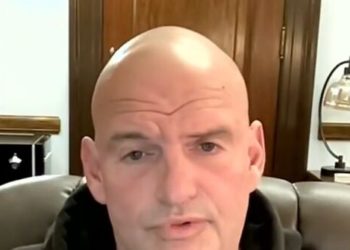The House oversight committee, under its Republican chairman, James Comer, has been a citadel of so much partisan hackery that it’s tempting to dismiss its recent report on President Joe Biden’s use of an autopen to grant pardons and commutations during his final days in office. But the 100-page report raises genuinely troubling questions about the way the late-stage Biden White House worked and, even more to the point, about the nature of the modern presidency.
To be sure, much in the report reflects the political priorities of its Republican authors, who, like President Trump, want to disparage Mr. Biden as a ventriloquist’s dummy operated by his staff. Based on sworn interviews with close Biden advisers, the report chronicles the last year or so of the Biden presidency and strains to inflate ordinary White House staff work into criminal conspiracies.
For example, the report describes a supposedly sinister effort by aides to manage the fallout from Mr. Biden’s disastrous debate with President Trump on June 27, 2024. But the Biden team was just doing its best, albeit for a futile cause, to save the president’s re-election campaign. A similar look at the labors of Ronald Reagan’s aides in the aftermath of his shambling performance in his first debate with Walter Mondale in 1984 would surely reveal a similar, and equally appropriate, picture.
But it’s a different story with Mr. Biden’s last-minute acts of clemency to thousands of recipients, all granted by autopen. Presidents, including Mr. Trump, have employed autopens for decades. The practice probably started under Dwight Eisenhower, was first publicly acknowledged under Gerald Ford, and received the formal blessing of the Justice Department in 2005, under George W. Bush. In that year, a detailed and thoughtful opinion from the Office of Legal Counsel in the Department of Justice made the common sense point that, in the modern world, the president “may sign a bill . . . by directing a subordinate to affix the president’s signature to such a bill, for example by autopen.”
Crucially, though, the D.O.J. opinion states that the president may not delegate the decision of “whether” to sign a bill. And that’s the key question about the pardons: Did Mr. Biden actually authorize all the pardons that were processed by autopen?
The Comer committee concluded that he did not. In an interview with The Times in July, Mr. Biden said he did approve all the pardons and authorized the use of the autopen to sign the documents. At a minimum, the committee report establishes that the White House process leading to these final pardon decisions was imperfect at best.
The report reveals considerable chaos during Mr. Biden’s last days in office. In part, this was due to the president’s dubious decision to follow several recent predecessors by jamming through controversial pardons at the very end of his term, in hopes of avoiding political accountability. As with similar last-minute pardons by George H.W. Bush, Bill Clinton and Donald Trump in his first term, this rushed practice led to political and ethical lapses. (Notably, George W. Bush and Barack Obama refused to demean their presidencies in this way.) Presidents possess the pardon power throughout their terms in office, and they should have the courage to exercise it when the public is still paying attention to what they’re doing.
But the report also raises several Biden-specific issues. As the June debate revealed, Mr. Biden was an 81-year-old man in decline. In later months, his staff sought ways to lighten his workload and formed, according to the committee report, “a cocoon around President Biden, thereby limiting his time spent with outer circle aides and Democratic Party leaders.”
Alas, in the final weeks of pardon discussions, the cocoon expanded to include the president’s son Hunter. Bad enough, it turns out, that the president had already pardoned Hunter after saying repeatedly that he wouldn’t, but the report reveals, shockingly, that Joe Biden involved the prodigal Hunter in discussions of which other pardons to issue.
The Comer investigation took place against the backdrop of President Trump’s vows to prosecute his political enemies, and that may have prompted Dr. Kevin O’Connor, the president’s longtime personal physician, to take the Fifth in response to all of the committee’s questions. But Dr. O’Connor’s refusal to say anything at all adds to the air of mystery and suspicion about the true state of Mr. Biden’s acuity in his last days in office.
Also for good reason, the Comer report raises questions about the propriety of the pardons, as well as the process for granting them. There is much to admire in President Biden’s determination to grant pardons to individuals who were convicted of nonviolent drug offenses and serving long sentences. But in granting nearly 2,500 such pardons, Mr. Biden acted over the objections of his own Office of the Pardon Attorney, in the Department of Justice, which performed rigorous scrutiny of the applicants for clemency. The report makes a good case, which was supported by career officials in the Justice Department, that the Biden team acted in undue haste at the last minute and rewarded some convicts who didn’t deserve to be released from prison.
Hyperventilating, the Republican authors of the report suggest that the pardons can somehow be undone and that Biden’s advisers might face criminal consequences for their actions. Not so; the pardons are irrevocable, and the aides committed no crimes. But the taint from this process, if not from the pardons themselves, will endure.
In a broader sense, though, the most important questions raised by the House report involve all presidents, now and in the future. What happens when a president’s physical or mental decline makes him unfit to continue to serve? And who decides?
The issue of presidential disability has haunted the Republic at least since 1919, when Woodrow Wilson’s wife, Edith, hid the effects of her husband’s stroke. A more serious inquiry than the one led by Chairman Comer would have acknowledged the seriousness and difficulty of the problem. Instead, the report settles for pot shots, some justified, against Joe Biden.
The irony is that if we are concerned that a president can be protected by a staff of sycophants, the risk now is greater than ever. No modern president has been surrounded by a more adoring staff than Donald Trump in his second term. As Mr. Trump, now 79, moves soon into his 80s, who can believe that the people around him will blow the whistle if he starts to slip?
In theory, the 25th Amendment addresses the issue of a president who is “unable to discharge the powers and duties of his office.” But its cumbersome procedures, requiring the concurrence of the vice president and a majority of the cabinet to sideline a president, do not inspire great confidence. The amendment trusts that a president’s loyalists will put their country’s interests above their own and their patron’s; history, not just in the Biden era, suggests that it might not be the best bet.
With the Supreme Court now in thrall to the unitary executive theory, which rejects almost any outside limits on a president’s power, it’s highly unlikely that any sort of independent oversight of presidential fitness would pass constitutional muster.
The stakes could scarcely be higher, especially in areas, like the pardon power, where the Constitution grants the other branches no check on presidential authority. But in the modern era, the risk of a few thousand bad pardons pales next to the peril posed by other areas of unilateral presidential control.
Congress has all but surrendered its constitutional prerogative to declare war, so now virtually all military decisions are left to presidents. They alone, in whatever shape they may be in, make decisions of life or death — in the nuclear age, no less.
The nation is addressing this risk by hoping for the best.
Jeffrey Toobin is a former assistant U.S. attorney who writes about the intersection of law and politics. He is the author of “The Nine: Inside the Secret World of the Supreme Court,” “The Pardon: The Politics of Presidential Mercy” and other books.
The Times is committed to publishing a diversity of letters to the editor. We’d like to hear what you think about this or any of our articles. Here are some tips. And here’s our email: [email protected].
Follow the New York Times Opinion section on Facebook, Instagram, TikTok, Bluesky, WhatsApp and Threads.
Jeffrey Toobin is a former assistant U.S. attorney who writes about the intersection of law and politics. He is the author of “The Nine: Inside the Secret World of the Supreme Court,” “The Pardon: The Politics of Presidential Mercy” and other books.
The post The Unanswered Question From the Biden Autopen Controversy appeared first on New York Times.




